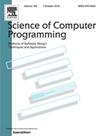基于smt的信号时序逻辑鲁棒模型检验
IF 1.4
4区 计算机科学
Q3 COMPUTER SCIENCE, SOFTWARE ENGINEERING
引用次数: 0
摘要
信号时序逻辑(STL)是一种用于指定连续信号属性的时序逻辑。STL已广泛应用于指定、监测和测试表现为离散和连续行为的混合系统的特性。然而,混合系统的模型检查技术主要局限于不变性和可达性。本文介绍了有界模型检验算法和混合系统通用STL特性的检验工具。我们技术的核心是STL的新逻辑基础,它包括:(i)语法分离,将STL公式分解为组件,每个组件完全依赖于信号的单独片段;(ii)信号离散化,确保通过一组离散元素对信号进行完全抽象;(iii) ϵ-strengthening,将鲁棒STL模型检查简化为布尔STL模型检查。在此基础上,鲁棒STL模型检验问题可以简化为一阶逻辑公式的可满足性问题。这使我们能够开发STL的第一个模型检查算法,该算法可以保证STL的正确性,直到给定的边界参数和鲁棒性阈值,以及混合系统的开创性有界模型检查器,称为STLmc。我们在一些混合系统案例研究中证明了STLmc的有效性。本文章由计算机程序翻译,如有差异,请以英文原文为准。
SMT-based robust model checking for signal temporal logic
Signal temporal logic (STL) is a temporal logic used to specify properties of continuous signals. STL has been widely applied in specifying, monitoring, and testing properties of hybrid systems that exhibit both discrete and continuous behavior. However, model checking techniques for hybrid systems have primarily been limited to invariant and reachability properties. This paper introduces bounded model checking algorithms and a tool for general STL properties of hybrid systems. Central to our technique is a novel logical foundation for STL, which includes: (i) syntactic separation, decomposing an STL formula into components, with each component depending exclusively on separate segments of a signal; (ii) signal discretization, ensuring a complete abstraction of a signal through a set of discrete elements; and (iii) ϵ-strengthening, reducing robust STL model checking to Boolean STL model checking. With this new foundation, the robust STL model checking problem can be reduced to the satisfiability of a first-order logic formula. This allows us to develop the first model checking algorithm for STL that can guarantee the correctness of STL up to given bound parameters and robustness threshold, along with a pioneering bounded model checker for hybrid systems, called STLmc. We demonstrate the effectiveness of STLmc on a number of hybrid system case studies.
求助全文
通过发布文献求助,成功后即可免费获取论文全文。
去求助
来源期刊

Science of Computer Programming
工程技术-计算机:软件工程
CiteScore
3.80
自引率
0.00%
发文量
76
审稿时长
67 days
期刊介绍:
Science of Computer Programming is dedicated to the distribution of research results in the areas of software systems development, use and maintenance, including the software aspects of hardware design.
The journal has a wide scope ranging from the many facets of methodological foundations to the details of technical issues andthe aspects of industrial practice.
The subjects of interest to SCP cover the entire spectrum of methods for the entire life cycle of software systems, including
• Requirements, specification, design, validation, verification, coding, testing, maintenance, metrics and renovation of software;
• Design, implementation and evaluation of programming languages;
• Programming environments, development tools, visualisation and animation;
• Management of the development process;
• Human factors in software, software for social interaction, software for social computing;
• Cyber physical systems, and software for the interaction between the physical and the machine;
• Software aspects of infrastructure services, system administration, and network management.
 求助内容:
求助内容: 应助结果提醒方式:
应助结果提醒方式:


